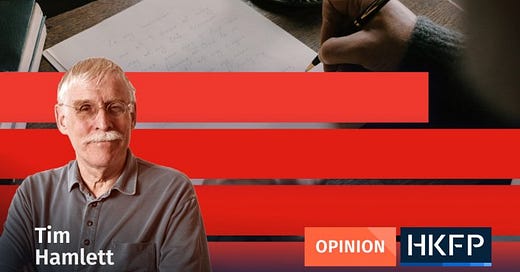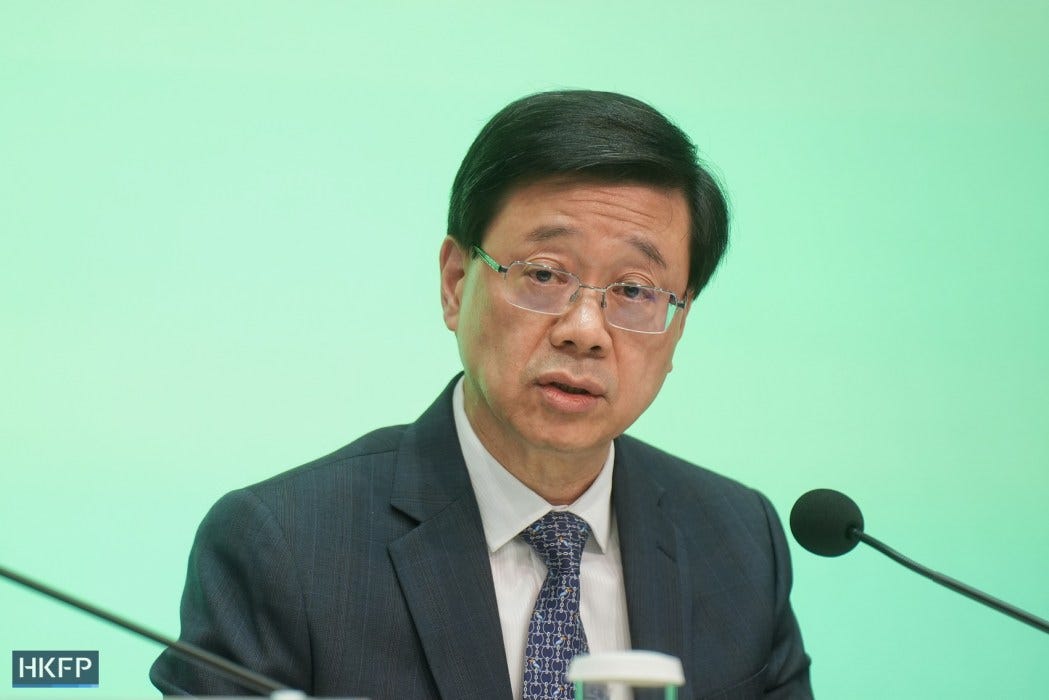‘Why I Am Giving up Writing About Hong Kong Politics’
One of the city’s most astute observers says it’s become too hazardous
By: Tim Hamlett
Tim Hamlett came to Hong Kong in 1980 to work for the Hong Kong Standard and has contributed to, or worked for, most of Hong Kong's English-language media outlets, notably as the editor of the Standard's award-winning investigative team, as a columnist in the South China Morning Post and as a presenter for RTHK's Mediawatch. In 1988, he became a full-time journalism teacher. Since officially retiring nine years ago, he has written on politics for the Hong Kong Free Press, where this appeared, and occasionally for Asia Sentinel.
Sometimes, as Joni Mitchell sang many years ago, you don’t know what you’ve got till it’s gone. Writing comments about public affairs only makes sense if there is a conversation to which you are contributing. But if one participant in the group erupts into angry shouting whenever criticized, you can’t have a conversation.
We are, of course, in dangerous times for people who do not share our government’s high opinion of itself. But the need to tiptoe through a legal minefield is only part of the problem.
There used to be a dialogue in which the government expressed its views through various channels and accepted that other views would be expressed through other channels, or indeed in the more broad-minded media in the same channels.
In order for this to be at all meaningful, though, it is necessary for both parties to entertain at least as an extraordinary and remote thought the possibility that they are wrong and the other people are at least partially right.
Nowadays, the government has its own facts and its own version of history. Any expression which does not actively subscribe to both is to be contested and condemned. Or as the Secretary for Security put it in a recent speech, “You can’t use misleading accusations to vilify the government… the government must speak up, clarify and condemn… and give the citizens the right to know.” This is not the context in which “the public right to know” usually comes up.
Still, it sounds very nice, in theory, but the practice is that comparatively harmless cartoonists and writers face a constant flow of official abuse, or as the Hong Kong Journalists Association put it when Ming Pao axed a long-running cartoon this week, “Backed by abundant resources and public power, the SAR government repeatedly targeted a mere [cartoonist], reflecting that Hong Kong cannot tolerate critical voices.”
I awaited with confidence an official clarification and condemnation of the JA’s many sins and errors, culminating in the claim that the government “welcomes criticism”, though in the light of recent and forthcoming electoral reforms criticism is likely to be in short supply. And here it is.
It is difficult to explain how the SAR government turned into such an intolerant creature. Was it encouraged by the local representatives of the motherland to dial up the Wolf Warrior domesticity? Or is this the result of the whole government adopting the approach of our historically prickly police force?
Legal intimidation through other channels also continues unchecked. This week Transit Jam, a website devoted entirely to the consideration of transport and planning matters, hastily closed after being attacked by one of the Liaison Office’s poodle papers.
Another straw in the wind: Hong Kong Baptist University (HKBU) effectively banned its student union because the latest leadership team had allegedly included “exaggerated, unfounded and biased” descriptions of past events in its annual work plan, election platform and budget published online.
I do not blame HKBU. Local universities are clearly no longer expected to have student unions. The only surviving one is now at Chinese U, and if I were its president I would be investing in a flak jacket.
But the person who complained (namelessly) to BU was clearly in tune with the times: there is an official version of history and deviations from it are not to be tolerated. Also, last week, a reporter was scolded in a press conference for referring to “the 2019 protests”. Apparently the only acceptable phrase now is “black violence”.
The conclusion to be drawn from all this is that there is no longer any point in writing about local politics. We still have politics, of course. Everyone has politics. Even North Korea has politics. But our politics are no longer conducted in public, so it is a disservice to your readers to write about the pantomime provided in its place.
Also, the risks seem to be increasing. There were, to quote another old song, “Ten green bottles hanging on the wall” and they have been falling one by one. I do not aspire to be the last one. I am still up for new experiences but the inside of a Hong Kong police cell is not on my bucket list.
So no more politics. This will please (or perhaps disappoint) the readers who from time to time express surprise that I am still at large. I will try to find less stressful things to write about.





"It is difficult to explain how the SAR government turned into such an intolerant creature." Well, look no further than to the rioters disguising themselves as "Press" during the riots in 2019/20. Or to Jimmy Lai calling for CIA intervention in HK through his propaganda sheet. And please don't tell me there is freedom of press in the US or the UK. Investigative journalism in these country is dead, with few exceptions such as Seymour Hersh. Remember Julian Assange, for example? But if you want to pursue a career in anti-China propaganda, just move to the UK and join the club. We in Hong Kong won't miss you.
It's very sad. Since 2012 (and actually a few years before), Hong Kong and the rest of the PRC has been dragged along on a one-way journey.